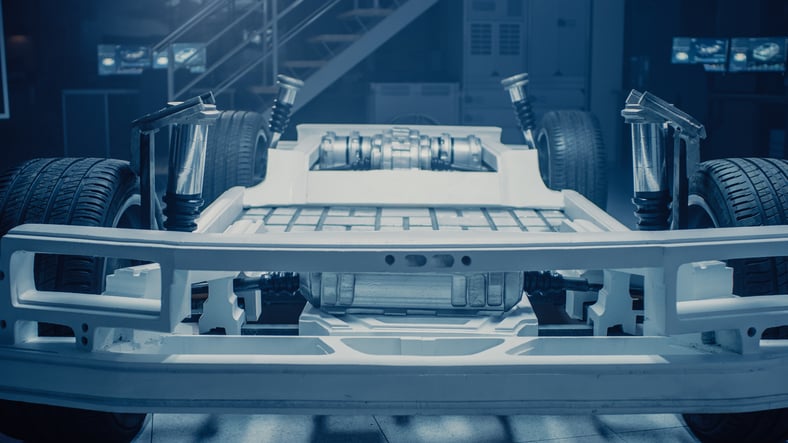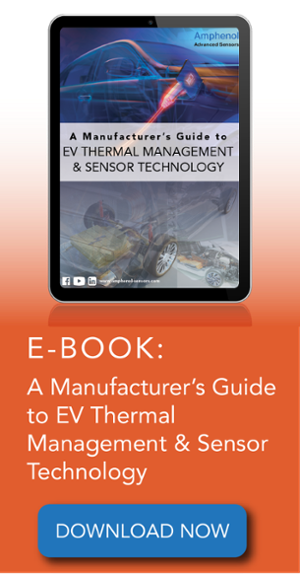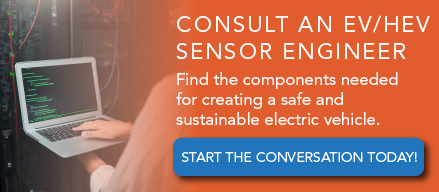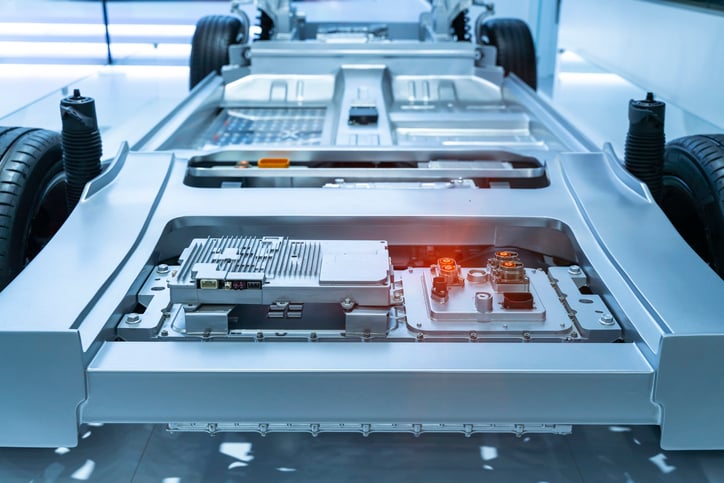What an Established OEM Sensor Manufacturer Does for EV Production

It’s one of those worst-case scenarios you hope never happens at your electric vehicle (EV) auto plant.
Because of some unforeseen issue, your production lines are down. Perhaps a supplier’s part didn’t make it in time. Or maybe a regulation changed, making a component of your vehicle out of compliance. Or maybe it's something as simple as a component being a hair too big or too small.
Regardless of the reason, downtime is the last thing your facility needs – it's costing you thousands of dollars a minute.
No matter the size of your auto manufacturing operation, downtime is a reality you'll face at one time or another. In a sense, it's an inherent cost of doing business.
However, the frequency, duration, and impact of downtime are controllable in many respects. One way to circumvent the full force of an unexpected halt to work is by having the right suppliers in place.
In the case of the devices that monitor a vehicle, partnering with an established OEM sensor manufacturer does more than help you react to downtime – it can help you prevent such a scenario from happening in the first place.
Optimizing Production With an OEM Sensor Manufacturer
There's nothing better for an automaker than to have its production lines up and running like a well-oiled machine. That means vehicles are getting made and sent to market.
Like other suppliers, an OEM sensor manufacturer that's established and experienced can give your production a shot in the arm to keep things on track. At the same time, a sensor manufacturer can also help prevent downtime in a number of other ways, including:
-
Workflow examination
-
Logistics/inventory management
-
Regulation compliance
1. Workflow Examination
 There's a certain simplicity about purchasing EV sensors "off the shelf." Essentially, you get what you pay for. No customization. No contact from the sensor manufacturer. No guarantee the part will always be available when you need it.
There's a certain simplicity about purchasing EV sensors "off the shelf." Essentially, you get what you pay for. No customization. No contact from the sensor manufacturer. No guarantee the part will always be available when you need it.
The story is very different with an experienced and established OEM sensor manufacturer.
One of the hallmarks of an optimized relationship with a sensor manufacturer is a site visit (if your EV sensor manufacturer hasn't been to your facility, insist that changes).
By visiting your plant(s) and getting a firsthand look at how production happens, a sensor manufacturer can determine the best point of entry for their product. Perhaps that's accomplished by having orders arrive in packaging that's easy to open and color-coded for differentiation – precious seconds saved accessing a sensor adds up. Or, in some cases, the sensor is best installed outside your plant directly to a component supplied by another vendor. Not only does this approach reduce the number of SKU to check (more on this later), but it also removes your engineers from making sure the sensor and component its monitoring fit together.
Beyond your production workflow, a site visit is also a chance for your sensor manufacturer to interface with your EV design engineers. The best sensors used in electric vehicles are those made specifically for a vehicle. With direct interaction on-site with your team, your sensor manufacturer's team can work together to design a sensor that's optimal for your needs.
With customized sensors, you can count on more robust performance, improved accuracy, and certainty that the device will stand up to the rigors of application.
2. Logistics/Inventory Management
Even on a day when everything is running smoothly, the dynamics of logistics are ... challenging.
Just like an electric vehicle, there are a lot of moving parts that must work in sync on a production line – especially logistics and inventory. And just like with an EV, the last thing anyone wants to worry about or deal with is when things aren't functioning as they should. Interruptions in receiving sensors & getting them where they need to be are, in some senses, exactly like a plant shutdown – both cost time and money.
Though hiccups in logistics and inventory management are inevitable, an OEM sensor manufacturer can help stave them off.
One of the key ways a sensor manufacturer can help reduce logistics and inventory issues is by establishing with your team an optimal supply chain for its parts. This approach entails multiple checks (such as the number of SKUs, what inventory codes are used, picking criteria, etc.), so that you're getting the right delivery at the right time – every time.
For example, if an automotive sensor manufacturer processes orders for your plant on a weekly basis, it's critical for them to know what manufacturing weeks you want their sensors delivered. When the OEM vendor has this baseline of information, they can make sure all sensors are ordered and ready to ship in time for each week's production schedule. The same goes for times when you need to ramp up production – your sensor manufacturer can make sure that its devices are there as you need them.
A reputable sensor manufacturer won't leave you to take an order of parts you can't use (a scenario that can happen because of contracts). When a sensor – regardless of the reason – is no longer usable before being installed (say, a performance regulation changes), your sensor manufacturer should help you address and fix the issue with produced inventory, rather than force you to accept what amounts to an order of scrap.
3. Regulation Compliance
Just like the latest vehicle trends or consumer demands, the laws and regulations governing vehicles change. Even the smallest adjustment to a regulation can have big impacts on the major components of electric vehicles. What's more, it only takes one part being out of compliance to require immediate changes.
The European Battery Directive is a prime example of this.
Established by the EU in 2020, the directive regulates the safety and sustainability of batteries. It impacts companies that make batteries and those that use them in their products (think: EV manufacturers). The directive seeks to ensure that all types of batteries produced, sold, or used within the EU are safe and environmentally friendly.
With regard to EV sensors, the legislation directive hits in several key ways:
-
Safety – EV sensors are required to meet specific safety metrics related to temperature control and overvoltage protection. These requirements ensure that EVs are safe from potential electrical hazards while providing accurate readings from the sensor data they generate.
-
Traceability – Battery producers must adhere to traceability requirements throughout all stages of production. This includes tracking materials used in production as well as associated production processes such as testing and quality assurance measures. Traceability is intended not only to ensure product safety but also to increase transparency across the entire supply chain.
-
Sustainability – All stages of a battery's production, as well as its third-party components (e.g. temperature sensors) must be audited for sustainability. This includes ensuring that the materials used in production don't contain certain toxic substances, as well as ensuring that air and water pollution caused by battery manufacturing processes are minimal.
To meet these requirements, an OEM sensor manufacturer must have a solid understanding of what your vehicle requires – and when it requires those sensors.
The EU Battery Directive is one example of the thousands of regulations EVs are subject to.
An OEM sensor manufacturer can help you stay in compliance with regulations by ensuring all sensors they produce meet required safety and performance metrics.
OEM Sensor Manufacturers: A Key Component for Steady, Predictable Production
As the number of electric and hybrid vehicles continues to grow, OEM sensor manufacturers will become an increasingly important part of keeping production lines moving steadily and predictably.
By partnering with a reliable sensor manufacturer, you can ensure that your vehicles are always in compliance with the latest regulations – no surprises, no last-minute scrambles to meet deadlines.
Take Your EV Production to the Next Level
Speak with one of our engineers about your needs today:




